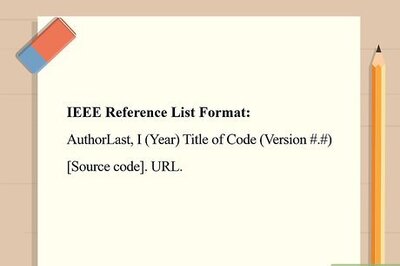
views
In September 2016, a public interest litigation (PIL) was filed in the Gujarat High Court seeking a ban on the location-based-augmented reality game ‘Pokemon Go’ as it hurt religious sentiments by showing images of eggs in places of worship of different religious groups. Though the petition was admitted and notices were issued to the developers of the game, the case was criticized for frivolity and the high court declined to ban the game.
But not all the cases that tend to “hurt religious sentiment” get resolved silently. In 1927, a case where the religious sentiments of a particular community were hurt by a publisher witnessed a tragic ending. The firm had published a tract that made certain disparaging remarks about the prophet Muhammad’s private life. A case was filed against the publisher under section 153A of IPC that penalizes an attempt to promote enmity between groups.
However, the high court acquitted the publisher of all charges. The acquittal was criticized and ultimately the publisher was murdered in 1927.
The case came to be known by ‘Rangeela Rasool’ and became a precursor to the enactment of section 295A of IPC which punishes those found guilty of the deliberate and malicious intention of outraging religious feelings. It was after this case that the need for a law dealing with the offense of hurting religious sentiments was felt and it led to a new law.
Amid the recent Adipurush row, the law and historic debates on hurting religious sentiments have taken centre stage.
“Hurting religious sentiments” was made an offense under the 295A of the IPC and is often invoked with another section; 153A IPC.
Section 295A of IPC
“Whoever, with the deliberate and malicious intention of outraging the religious feelings of any class of citizens of India by words, either spoken or written, or by signs or by visible representations or otherwise, insults or attempts to insult the religion or the religious beliefs of that class, shall be punished with imprisonment of either description for a term which may extend to [three years], or with fine, or with both,” says the section.
Section 153A IPC
Section 153A IPC penalizes the ‘promotion of enmity between different groups on grounds of religion, race, place of birth, residence, language, etc and acts prejudicial to maintenance of harmony’.
Section 295 of IPC
Section 295 of the IPC makes destruction, damage, or defilement of a place of worship or an object held sacred, with intent to insult the religion of a class of persons, punishable with imprisonment which may extend to two years, or with a fine, or with both. This section has been enacted to compel people to respect the religious susceptibilities of persons of different religious persuasion or creeds.
Section 298 of IPC
Uttering, words, etc with deliberate intent to wound the religious feelings of any person.—Whoever, with the deliberate intention of wounding the religious feelings of any person, utters any word or makes any sound in the hearing of that person or makes any gesture in the sight of that person or places, any object in the sight of that person, shall be punished with imprisonment of either description for a term which may extend to one year, or with fine, or with both.
Let’s take a look at similar landmark cases:
Landmark cases
Ramji Lal Modi versus State of Uttar Pradesh
In this case, the Supreme Court upheld the constitutional validity of section 295A and termed it necessary to protect public order. As a result, it is now considered a justifiable limitation on freedom of speech and expression under Article 19(2) of the Indian Constitution of 1950.
Baba Khalil Ahmed v State of Uttar Pradesh
In this case, decided in 1960 the Supreme Court said that “malicious intent” of the accused can be determined not just from the speech in question but also from external sources.
Ramlal Puri v State of Madhya Pradesh
In this very important case, the Supreme Court held that a difference should be made between the types of actions that tend to offend religious sentiments. In the judgment, the apex court said, “The test that is to be applied to such cases is not that of an abnormal or hypersensitive man, but that of an ordinary man of ordinary common sense and prudence”.
MS Dhoni case
In April 2017 while expressing concern over misuse of section 295A of IPC a bench of Justices Dipak Misra, A M Khanwilkar and M M Shantanagoudar said, “Insults to religion offered unwittingly or carelessly or without any deliberate or malicious intention to outrage the religious feelings of that class do not come within the section”. The case was related to cricketer MS Dhoni who had challenged the criminal proceedings initiated against him for hurting religious sentiments for being portrayed as “Lord Vishnu“ on the cover of a business magazine in 2013.
Section 295A has been highly misused is a fact that has been highlighted by the apex court and various high courts. But the need for such a law from the point of preserving public order can also be not ignored.
Adipurush Row
Most recently, the Allahabad High Court came heavily on the makers of Adipurush while hearing two PILs filed against exhibitions and dialogues of the feature film.
During the hearing, the court said, “You should not touch Quran, Bible, and other sacred texts. We may make it clear that it is not about any one religion. But you should not depict any religion in a bad light. The Court has no religion of its own. Our only concern is that the law and order situation should be maintained”.
It is important to note that freedom of speech and expression guaranteed under Article 19 of the constitution which also covers the right of the press or freedom for any form of artistic expression is regulated by certain limitations and riders. And, public order and morality are important parts of it. Hence the presence of section 295A can act as a reasonable restriction on article 19; a fact highlighted by courts in several judgments.
In this respect an important observation was made by C.S Adcock, professor of history, at Washington University in his paper titled ‘Violence, Passion, And The Law: A Brief History Of Section 295A And Its Antecedents’, where he wrotes, “The lawsuit filed against Wendy Doniger’s The Hindu: An Alternative History under section 295A of the Indian Penal Code prompted a controversy about free speech. Section 295A punishes speech that offends the religious feelings of a group of Indian citizens. According to one view, rigorous application of laws like 295A is justified, because peaceful coexistence in a plural society like India depends on great restraint in the discussion of religion.”
He added, “The history of section 295A and its antecedents shows that contrary to expectations, such laws have not functioned to prevent violence. Instead, they have encouraged violent displays, feeding the contemporary politics of religious sentiments.”


















Comments
0 comment